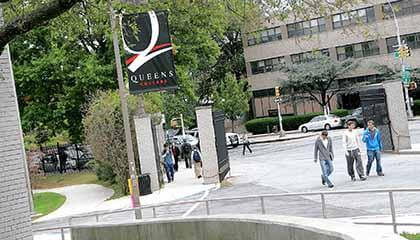By Connor Adams Sheets
One of the final sticking points keeping the new state budget from passing in the final days of negotiations was a set of higher education proposals which were left out of the final document.
The SUNY Empowerment Act would have enacted major changes in the way New York’s CUNY and SUNY systems — and the individual schools that make them up — are run and paid for.
After the state Assembly passed a budget early last month, the state Senate was unable to do so, in large part because of divisions over the SUNY Empowerment Act, but eventually Senate Democratic leaders were able to rally their ranks in support of the budget despite the lack of action on the college issues.
Negotiations continue, however, according to Sen. Toby Stavisky (D-Whitestone), chairwoman of the Senate Higher Education Committee, and a set of workable solutions to some of the most significant problems facing the state’s higher education system may work its way into law when the state Legislature reconvenes in mid-September.
“There are negotiations going on between the Assembly, the Senate and the governor’s office to try to come up with an agreement,” Stavisky said. “The purpose of this was to rekindle the negotiations which had fallen off.”
Those negotiations, which will continue through the current recess, concern the controversial aspects of the bill.
Sen. Frank Padavan (R-Bellerose) and Stavisky are in agreement that SUNY and CUNY schools deserve more autonomy from the state when deciding how to spend their money — as long as there is accountability. That idea was on the table until Senate Democrats withdrew the bill last week when they realized they would not be able to get enough votes to pass it.
“The bill that came up last week, Tuesday, the roll call was withdrawn twice because we did not have the votes to pass it in the Senate — and that’s probably a good thing, quite frankly, because there were parts of that bill that went too far,” Stavisky said.
Padavan and many Republicans endorsed a provision in the bill that would have allowed a number of select schools, including Queens College, to set up special public-private partnerships, but many Democrats were opposed.
“I spoke on the floor against that,” Stavisky said. “I think that’s a big mistake because I don’t want to see York College and Queens College in competition for students based on tuition.”
Another Democrat-supported feature of the plan would set up a stepped structure for tuition increases, which would increase along with funding for the state Tuition Assistance Program, or TAP which helps low- and middle-income families pay for college.
When students enrolled in school, they would have less uncertainty about what that meant for them financially, as it would have locked in tuition increases at 4 percent after a pupil’s first year and 2 percent every following year. The aim, Stavisky said, was to avoid double-digit annual jumps, which have been common for the last 20 years.
Padavan, however, said such a scheme would be a burden on families and that Republicans did not support it.
“The middle-income families get the minimum TAP, and the proposed TAP increases would not have covered that increase for the middle class because TAP is based on family income,” Padavan said. “The bottom line is we don’t want colleges to be pricing themselves too high for students to be able to attend them.”
But the issues involving city and state schools need to be addressed soon, Stavisky said.
“It’s simply an attempt to make SUNY and CUNY more competitive and to marry the economic development aspects of a locality with the academic,” she said.
Reach reporter Connor Adams Sheets by e-mail at csheets@cnglocal.com or by phone at 718-260-4538.






























